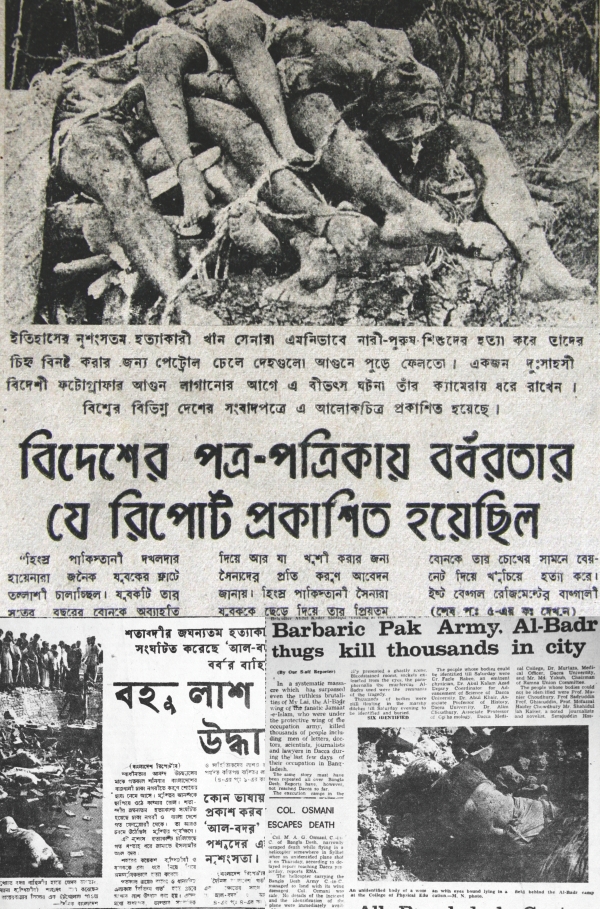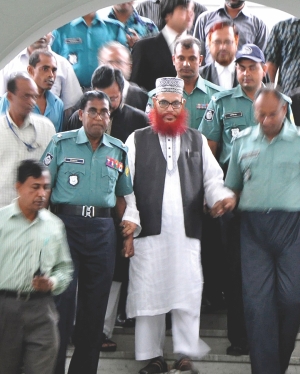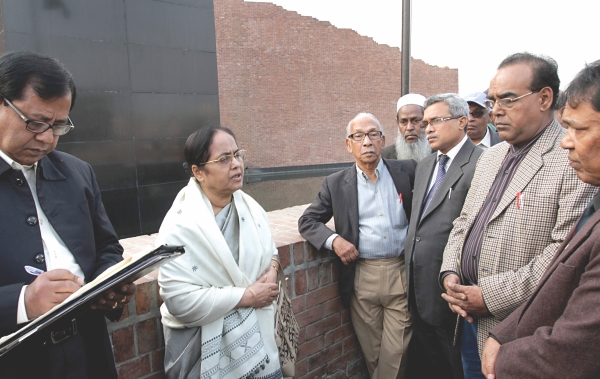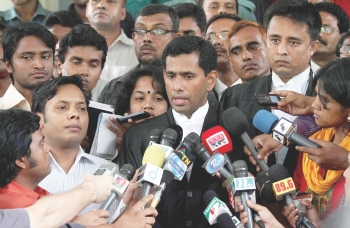| Home - Back Issues - The Team - Contact Us |
 |
| Volume 10 |Issue 39 | October 14, 2011 | |
|
|
Cover Story Is the Wait Over? One of the electoral pledges that led to Awami League's landslide victory in the 2008 election has been the trial of war criminals. Amongst much anticipation, the government finally amended the International Crimes Tribunal (ICT) Act 1973 in 2009 and set up the tribunal in March 25, 2010. Although seven suspects have been arrested, till date, for crimes under ICT, they are yet to be tried. Meanwhile, the other major political party, Bangladesh Nationalist Party and its main ally Jamaat-e-Islami are vehemently opposing the activities of the tribunal. With two years left for the next election, the opposition's stance and the slow-paced progress of the trial are creating apprehension — will the tribunal be a victim of the clichéd political-game of the country? Tamanna Khan December 22, 1971. An AP report published in the New York Times quotes a police officer Inspector General Abdul Khaliq: “The whole country is a mass grave. Who knows how many millions have been killed?” Bangladesh's independence in 1971 came at the cost of innumerable lives - tortured, raped and systematically murdered by Pakistan Army and their Bengali cohorts. It was a war wherein every convention of human rights was violated by the professionally trained Pakistan Army—their methods of torture only comparable to that of the Nazis during World War II. They have committed internationally recognised crimes which cannot be allowed to go unpunished. Impunity for such crimes only relegates human rights, legalising genocide in the name of religious or political unity. Thus, even after forty years, the tribunal of the war criminals of Bangladesh remains relevant and necessary. “Three of us were arrested by some army men, accompanied by Bengali men in civil dres, from a half burnt house in Hazari Lane (Chittagong) on July 5, 1971,” begins Nizamuddin Ahmed, journalist and former Reuter correspondent, who was detained and tortured by Pakistani Army for helping liberation forces during the Liberation War. “We were taken to a house on top of a hill and I was placed before Salahuddin Quader Chowdhury's father Fazlul Quader Chowdhury,” he recounts adding that Fazlul Quader, then a leader of Muslim league was angry for losing in the election, to Awami League.
“He (Fazlul Quader) jumped from his sofa; and cursing my family, hit me a couple of times, shouting in the dialect of Chittagong 'shala muktijuddha'. I think I am the only surviving man who was directly beaten by Fazlul Quader Chowdhury,” recalls Nizamuddin grasping for words to describe the brutality of the torture that followed. “From the evening of July 5 to July 6, I was interrogated and tortured at Fazlul Quader's house at Goods Hill,” he says, “later I was taken to an army camp at Chittagong stadium.” Nizamuddin was then detained at Chittagong Central Jail till his release on November 18, 1971. Nizamuddin says that after the Liberation War, he came to know from an alleged collaborator, called Sikander that Salahuddin Quader Chowdhury had been one of the few Bengali men in civil dress, who led the Pakistani Army to the pro-liberation forces' hideout at Hazari Lane. He adds that Fazlul Quader Chowdhury's crony Shafi Ahmed, the then owner of Pakistan Hosiery Mill, had confirmed the matter when he was confronted by him. Forty years later, Nizamuddin, still waits for the sentence of that very perpetrator who handed him over to the enemy. “The trial will take place only if the nation reaches a consensus that the tribunal should be held,” he hopes, explaining that the next government, irrespective of their political ideology, should have the commitment to continue the tribunal initiated by the present government.
History stands witness to the fact that justice in Bangladesh repeatedly becomes a hostage of politics with a change of regime. The trial of the Bangabandhu murder case is a unique example in this regard. The regime that came to power after his assassination first indemnified the killers, later the progress of the trial was withheld during the BNP regime in 2001. In Bangladesh, the fate of many other cases, where political elements are involved, has changed with regimes. The same fear looms around the International Crimes Tribunal and BNP chairperson Begum Khaleda Zia's remarks at September 29th's rally in 2011 terming the war crimes tribunal “A mockery of trial” is an ominous sign. Khaleda, in fact, has demanded the release of the suspected war criminals whose atrocities and crimes during 1971 have been historically documented. Besides the possibility of the trial being abandoned under a different regime, the slow progress of the tribunal under the present regime is creating a sense of frustration among the general public. Almost a year has passed since the arrest of Jamaat Ameer Motiur Rahman Nizami, Secretary General Ali Ahsan Mojahid, Nayeb-e-Ameer Delwar Hossain Sayedee, senior secretaries general Muhmmad Kamaruzzaman and Abdul Kader Molla, Bangladesh Nationalist Party's (BNP) Standing Committee member Salahuddin Quader Chowdhury and former BNP lawmaker Abdul Alim (later released on conditional bail). Among the seven alleged collaborators, only Sayedee has been indicted with 20 specific charges for committing war crimes, genocide, crimes against humanity and peace; his trial begins on October 30, 2011, 14 months after the issue of his arrest warrant. Most of the time, Sayedee's ill health has been given as one of the major causes of postponement of hearing for the framing of charges. Many a times unexpected impediments such as structural reform of the court building, pages of the investigation report being illegible, failure to provide all documents of evidence to the defence counsel, have caused the delay. However, it is the preparation and submission of the investigation report that takes the longest time. Recently, an investigation report with proof of BNP leader Salahuddin Quader Chowdhury's involvement in 32 incidents of crimes against humanity in greater Chittagong during the 1971 Liberation War has been submitted to the ICT. Investigation of crimes committed in 1971 by rest of the alleged arrestees is still ongoing. Getting the logistical support needed to collect evidence has been a huge challenge. The Investigation Agency, initially formed with five investigation officers now has 14 officers working under the coordination of former Inspector General of Police (IGP) Abdul Hannan Khan. The agency specially appointed to investigate crimes committed during the Liberation War nevertheless requires huge logistical support to extract and investigate evidence 40 years old, scattered all across Bangladesh and sometimes even beyond the border. “Evidence includes documents of that period, newspaper and magazine clippings, government reports plus victims (those who are alive) and eye-witness's accounts. We have received documents and newspapers from museums, Bangla Academy, the Liberation War Museum and reporting archives of newspapers. We are visiting different spots to collect victims' and witnesses' statements. For foreign documents we are contacting foreign ministry and embassies,” informs Md Matiur Rahman, additional SP and member of the Investigation Agency. He adds that collection of the latter two types of evidence takes time. “Till last year, proper logistical support was not in place. We had shortage of cars, laptops and other devices” informs Matiur adding that this year these problems have been addressed and as a result, investigation is being carried out in full swing. Writer-journalist Shahriar Kabir, Executive President of Ekatturer Ghatak Dalal Nirmul Committee (a civil society movement initiated in 1992 by Shaheed Janani Jahanara Imam to garner support for the trial of war criminals of the Liberation War) supports Matiur's reasoning for the delay in investigation. He says that many of the victims and eye-witnesses, who testified during the fact finding mission carried out in 1993 for the National People's Inquiry Commission headed by Sufia Kamal, have either died or changed address. As a result, finding those who are still alive now, after almost forty years since independence, is itself a big challenge and a time consuming process.
The absence of witness and victim protection law is likely to create another problem in collecting evidence. Since many of the alleged war criminals hold powerful positions, they are very likely to try and silence the witnesses and victims. A third reason may be attributed to the lack of experience in handling this sort of investigation. Explaining the illegibility of the pages of the investigation report on Sayedee, Matiur says: “Initially, we did not have enough expertise in scanning the old newsprints. Most of the scanned copies came out black. However, such incidence will not occur in future.” Besides insufficient experience, failure to realise the importance of the task creates impediments in the way of efficient and fair trial, according to Shahriar Kabir. “Many have come to the investigation agency from government institutions on deputation. Those who come on deputation perceive the task in light of a government organisation. This job is not like that of a government agency. If required they need to attend office on Fridays and Saturdays, or work 24 hours a day. They do not have this realisation nor is there any incentive to induce this realisation,” he says. In Shahriar's view the government, in spite of its best intention and effort, has failed to realise the scale and magnitude of work required in carrying out the task. “We have been emphasising the need for 25 lawyers to run the trial of these six-seven people. So far 11 lawyers have been appointed and we have found that among them only four come to office regularly, the rest are handling other cases and they come to the court only on the days of hearing,” he informs adding that the lawyers fail to differentiate the trial from traditional criminal cases. “They do not realise the need for researching the cases by say, going through newspaper clippings, or visiting different places or collecting visuals from different sources,” he criticises. Ironically, government ministers and policy makers' assurance of quick completion of the trial creates scope for criticism by opposition. The situation has been explained by law minister Barrister Shafique Ahmed at a seminar on September 18, 2011. “If I give you a timeline about the completion of the trial today, the next day the defence counsel will blame the government for trying to influence the tribunal,” he says. Unfortunately, Jamaat has successfully been able to convince many foreign legal and human rights organisations and individuals about the politicisation of the trial by the present government. This has led to questions raised by the International Bar Association, Amnesty International, US War Crimes Ambassador Stephen J Rapp and British politician Lord Eric Avebury to name a few. One of the matters of concern raised by Lord Eric Avebury is that the Tribunal has only targeted members of the opposition. On the other hand, Bangladeshis who are well acquainted with the deeds of the alleged collaborators currently in custody, question the number — “why only these seven razakars?” Investigator Matiur says that they started investigation on Nizami, Mojahid, Sayedee, Kamaruzzaman, Abdul Qader, Salahuddin Quader and Abdul Alim based on information printed in different newspapers and books by writers like Shahriar Kabir, Muntasir Mamum, Dr M A Hasan. It is known that the alleged Jamaat and BNP leaders were at the leading positions of the auxiliary collaborating forces of the Pakistani Army, he adds. It is a historical fact that Jamaat-e-Islami and some members linked to Al Badr and Al Shams not only opposed the Liberation War but also actively participated in committing genocide, rape, crimes against humanity and peace. However their political position today does not nullify the crime committed by leaders and activists of Jamaat-e-Islami in 1971.
On the other hand, logistical and financial constraints make it impossible to try all war criminals at once. Giving instances of the Nuremberg trials where initially only 21 war criminals were tried, Shahriar says: “We are starting with 7-10 people, but it is not right to assume that once the tenure of the present government ends, the tribunal or ICT's activities will come to an end. We are at first trying the top-level war criminals centrally, later we shall try war criminals at district, thana and union levels.” However, Shahriar stresses on the need for sufficient information and evidence to carry out the trials. “Our priority should be the top level war criminals and those who are still politically active and are following the same ideology, they practised then,” Shahriar says referring to Jamaat-e-Islami who actively supported West Pakistan authorities in their political decision to curb the just demands of the Bengalis. According to The Daily Star report of September 21, 2010 investigators and prosecutors specially appointed for this task collected evidence against twelve people, — Ghulam Azam, Mir Kasem, Abdul Hannan, Abul Kalam Azad, Abdus Sobhan and the seven who were later arrested on charges of war crimes. Among the 12 accused, five — Nizami, Mojahid, Kamaruzzaman, Abdul Quader and Sayedee, were already in jail at that time. Later on, on December 16, Salahuddin Quader was arrested on a different charge. Interestingly, all of the six alleged war criminals who are presently in jail, have been initially arrested in charges other than war crimes, genocide crimes against humanity and peace. Even after a year, investigation into the allegations against Ghulam Azam (the then Ameer of Jamaat-e-Islami in East Pakistan under whose leadership Peace Committees that recruited razakars and notorious militia groups -the Al-Badr and Al-Shams, were formed) has not been completed. Although another report of The Daily Star dated March 6, 2011, states that investigators have found evidence and witnesses who testified against Ghulam Azam's atrocity at Rajshahi in 1971, no petition of complaint has been filed against Ghulam Azam; neither has he been arrested. Nevertheless, investigators continue to give assurance of submitting the report to the tribunal soon. When chief prosecutor Ghulam Arieff Tipoo is asked about this, he asserts that each case is different and everyone will be brought under trial. He assures that Ghulam Azam will be arrested at the opportune moment. When the law minister was asked about Ghulam Azam's arrest at a seminar on September 18, 2011, he said: “I cannot mention the name of any particular individual. I have some restriction about it. It is not the responsibility of government to decide who will be brought to trial. It is the responsibility of the investigation agency and prosecution team. If government mentions any name then, it will be said that the tribunal is being influenced. For this investigation agency, prosecution team and tribunal are there.” Echoing Lord Avebury's concern about the participation of foreign counsel in the tribunal, Advocate Muhammad Tajul Islam, leading the defence counsel, accuses Bangladesh Bar Council of being politicised and thus not issuing permission for foreign lawyers' participation. He refers to the denial of Bangladeshi visa to British lawyer Toby Cadman at Shahjalal International Airport in Dhaka. Barrister Tureen Afroz, legal secretary of Ekatturer Ghatak Dalal Nirmul Committee, has explained the action differently in a statement published in reply to Lord Avebury's concern about the same matter. According to Tureen, the decision to restrict Cadman's entry into Bangladesh was made by immigration authority of Bangladesh and not by the Bar Council. Immigration authorities denied his entry based on intelligence information that Cadman has been coming to Bangladesh to campaign against the initiative of war crimes tribunal. Furthermore, Bangladesh Legal Practitioner's and Bar Council Order 1972, requires a person to be a Bangladeshi citizen to receive the council's certificate to practice in Bangladesh. Advocate Muhammad Tajul Islam, member of the defence counsel, meanwhile, points out a number of flaws in the ICT Act 1973 saying it does not meet international standards even after the amendments done in 2009. Referring to the restriction of the ICT Act 1973 in challenging the neutrality and qualification of judges, he says: “We have heard and it is even documented that the chairman of the tribunal was involved with Ghatak Dalal Nirmul Committee and participated in preparing the report of the People's Inquiry Commission. How can a person who is connected to one side be the chairman of a tribunal?” According to Shahriar Kabir, however, tribunal Chairman Nizamul Haque Nasim was neither the member of the People's Inquiry Commission or People's court, he was rather one of the forty members of the Secretariat of the People's Commission that had the responsibility to collect information and evidence and publish a report to help create consensus in favour of trial of war criminals. However, Tajul argues: “That report has been used as evidence in the tribunal,” quoting a clause from natural justice (procedural rights in the English legal system and the systems of other nations based on it) that 'no man shall be judge in his own cause'. Here Justice Robert H Jackson can be quoted from his opening statement of the Nuremberg prosecution “Unfortunately the nature of these crimes is such that both prosecution and judgment must be by victor nations over vanquished foes. The worldwide scope of the aggressions carried out by these men has left but few real neutrals. Either the victors must judge the vanquished or we must leave the defeated to judge themselves.” The nine months of massacre and torture that Pakistan Army had unleashed throughout Bangladesh in 1971 with the help of collaborators can be compared to the aggression of World War II. Thus in our case too it is only natural that the victors will judge the defeated. However, that must be done through the legal system of the land so that we can break out of 40 years of impunity of the war criminals and give a semblance of justice to those innumerable victims and their families. For that to happen we need to ensure an independent tribunal free of all political motivation and ill-will. A tribunal, as Shahriar Kabir suggests, that will be a financially and administratively independent autonomous body that can smoothly carry out its responsibilities without any interference from the government. “It is true that if Jamaat-BNP comes to power, the trials might not take place. That is why we are urging the government to enact laws so that the tribunal will not be closed; the institution will be there no matter which government comes to power. If needed, the tribunal can be turned into a constitutional body,” Shahriar emphasises.
Copyright (R) thedailystar.net 2011 |
||||||



